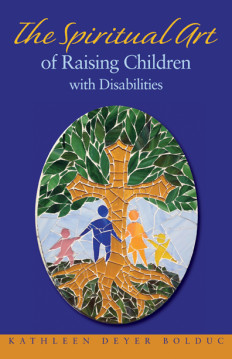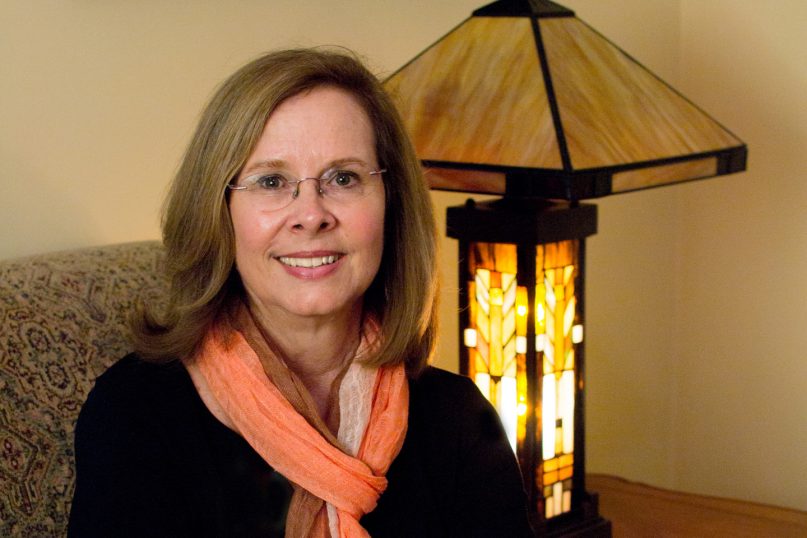Parents of children with disabilities are no strangers to heartache, even despair. Divorce rates are high and depression is not uncommon.
Such parents also often struggle with God, a fact that Kathleen Bolduc knows firsthand. Her son Joel, now 29, was diagnosed with intellectual disabilities at the age of three, and with autism at age twelve. Bolduc says Joel has been her “greatest spiritual teacher” but also her greatest challenge, a story she recounted in her books His Name is Joel and A Place Called Acceptance.
Now she has a new book specifically about for parents whose faith has been shaken by day-to-day life with a special-needs child. The Spiritual Art of Raising Children with Disabilities argues that such children can give us wisdom and help bring us closer to God — if we learn how to pay attention.
RNS: What’s the book about?
Bolduc: Parenting a child with a disability requires vast stores of energy, creativity, patience and wisdom. There are days when we feel like Humpty Dumpty, surrounded by the broken pieces of life as we once knew it. Where do we go when we feel as if reconstruction is impossible? When we’re too tired for one more meltdown, IEP meeting or sleepless night? When we’re full of questions for God; struggling with anxiety, depression, or anger; when we’re wondering if our marriage will make it through, intact?
The Spiritual Art of Raising Children with Disabilities uses the mosaic as a metaphor for putting the pieces of life back together again, and the spiritual disciplines as a framework for daily works of healing and restoration. It offers bite-sized pieces of poetry, scripture, personal narrative and teaching on the grief process, the upside-down nature of the Kingdom of God, and the spiritual disciplines.
RNS: What do you mean, the mosaic is a metaphor?
Bolduc: When we receive a diagnosis, life kinds of falls apart. How do we put those pieces back together again? That’s what a mosaic artist does—takes broken shards of glass or pottery and reconfigures it all, sometimes into a more beautiful form than it was before. But it takes a lot of work.
 RNS: Who do you hope will read this and benefit from it?
RNS: Who do you hope will read this and benefit from it?
Bolduc: The audience is parents and caregivers of children with disabilities, as well as people who work with those parents: people in the schools, spiritual directors, pastors, therapists. It’s really written from a spiritual direction standpoint. I’ve been trained as a spiritual director myself. My hope is to walk alongside parents who are struggling, to validate the questions they’re asking, and to help them pay attention.
I also think it’s the type of book that would help people who are clueless about what it means to have a kid with disability. I’ve had people buy my other books to give to family members who just don’t understand what the parents of kids with disabilities are going through.
RNS: What questions do parents ask?
Bolduc: “Why me? Why my child? Why does God allow this to happen? Where is God in the midst of this?” The chapters on mindfulness and gratitude are two of the places where people start to find God in the everyday. The chapter on mindfulness is to take an object outside and pare it down to one square inch. Write down what you see. What is there in that one square inch? That idea was given to me by a mother whose son has autism. That’s something he has taught her, the attention to everyday things.
RNS: What spiritual practices have been most helpful for you in raising a child with disabilities?
Bolduc: Meditation is one. I say in the book that meditation saved my life. I think it’s being able to learn to go to that place beyond words, where you can be in the presence of God and just get refilled and renewed.
Worship is another. I talk in the book about what Joel has taught me about worship—learning to worship with abandon, without worrying what anybody around you thinks. Worshiping with pure joy. And that’s a discipline that will bring us out of places of darkness.
One of the other disciplines I write about is lectio divina. That has been key for me in learning that the scriptures speak to me personally. I’ve always had a hard time with regular Bible study, which I find boring. In lectio you move from the head to the heart with a very short piece of scripture. How does the scripture intersect with my life today, and what is God’s invitation to me today? It’s very personal. I do it in a group, and while it’s personal, it’s also in community because we share with one another.







